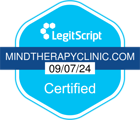Use of EEG technology to match brain patterns with the right medication.
Most clients we see have failed two or more medication therapies for their mental disorders. We are here to correct the course of their treatments.
Technologies such as EEGs (eletroencephalograms), used to measure electrical activity in the brain, are used to match abnormal brain patterns with the improvements found using a specific drug or a combination of drugs.
PEER Online is a technology developed by MYnd Analytics provides the first clinically useful method of guiding medication treatment based upon identified brain abnormalities. The technology is based upon data collected from 7,000 patients over many years, treated with some 17,000 different medications. Because treatment is based upon selecting medications demonstrated to address specific brain abnormalities rather than on a group of symptoms, rEEG appears useful in treating a broad range of psychiatric diagnoses.
PEER (Psychiatric EEG Evaluation Registry)
What is Psychiatric EEG Evaluation Registry (PEER)?
- A simple computerized electroencephalogram (EEG) is collected. An EEG records a person's electrical activity, much like an EKG does for the heart. This helps us to understand your unique brain patterns or neurophysiology.
- The EEG is compared to people with similar EEGs to see which medications worked and which didn't.
- A PEER Outcome Report is generated which will help guide your doctor to better understand treatment options specifically designed for you.
rEEG study on its effectiveness to predict best medication choices
Dr. Mark Schiller, Founder and Medical Director of the MindTherapy Clinic is helping to prove that referenced-EEG “(rEEG)” guided pharmacotherapy represents an easy, relatively inexpensive, objective office procedure that builds upon clinical judgment to guide antidepressant medication choice.” In partnership with his co-authors and researchers at Stanford, Harvard, Rush University, UC Irvine, and others, Schiller’s research showed that patients with treatment resistant depression whose prescribing was guided by the rEEG improved at a statistically significant rate over control subjects whose treatment decisions were driven by the National Institute of Health’s treatment protocol known as STAR*D, an industry standard.
“Referenced EEG [rEEG] is not a cure-all. But, for many patients it gives us a non-invasive, relatively inexpensive way to obtain a set of brain measures that guide medication choices much more effectively than conventional methods alone.” Schiller and the team’s work is based on previous research that has shown EEG’s usefulness to predict treatment response in depression including a study that used frontal lobe EEG examination to identify a biomarker that can predict the effectiveness of a particular SSRI. Referenced EEG differs from a standard EEG (QEEG) by comparing the findings to a database of normals and then to a database of individuals who are symptomatic for depression. “By comparing the QEEG in a given patient to QEEGs in a database of patients who have been tried on and responded to a specific medication, rEEG may be able to predict a response to a wide number of medications,” according to the published report (p.2). Noteworthy is the way in which the rEEG suggests medication choices based on how the brain is functioning rather than the patient’s report of depressive symptoms. This makes it possible for the psychiatrist to work outside the box of orthodox prescribing that historically has been informed by patient reports of how they feel. Now Dr. Schiller and colleagues may make medication choices based on how the brain will likely respond.
rEEG Study design
Participants in the study were 18 years of age or older who met current criteria for major depressive disorder and had recent medication failures using SSRIs or other antidepressants. They were divided into groups based on the number of previous medication failures: one group included subjects with depression treatment failure after one or more SSRIs in the current episode, and the other, those with failure after at least two classes of antidepressant in the current episode. Subjects were excluded from the study whose depression might have resulted from head injury, a seizure disorder, a bipolar condition, schizophrenia, dementia, developmental delay, substance abuse, pregnancy, or chronic pain. Although 465 volunteers with depression made themselves available for the study, 114 participants met the rigorous criteria and were then randomized into one of two treatment groups.
One group, the control group, received depression therapy based on a treatment algorithm designed to use the most effective medications suggested by the STAR*D treatment protocol. The other group received rEEG-guided therapy, the protocol under investigation. All subjects completed a washout period from their current medications (medically managed) and any other psychoactive substances prior to receiving either the control or the rEEG. Depression levels were measured using symptom checklists, specifically the QIDS-SR16 and the Q-LES-Q-SF. The measured treatment course averaged 115 days (about 16 weeks) following washout.
Results
Participants whose medication choices were guided by the rEEG protocol reported significantly less depression than their STAR*D treated counterparts. On the QIDs-SR16 (depression measure) the magnitude of improvement was 65% for rEEG compared to only 39% for the controls. Similar findings were obtained on the Q-LES-Q-SF as well as on 9 of the 12 secondary outcome measures employed. It was also true that week to week analysis showed statistically increasing improvement in the rEEG group demonstrating its superiority in reducing patients’ depressive symptoms.
The article is in press: DeBattista C, et al., The use of referenced-EEG (rEEG) in assisting medication selection for the treatment of depression, Journal of Psychiatric Research (2010), doi:10.1016/j.jpsychires.2010.05.009.
More information on PEER Online and EEG studies
Learn more about rEEG, its use at MindTherapy Clinic or to explore whether it might be right for you or your loved one.
Insurance information
Does my insurance cover rEEG screening?



